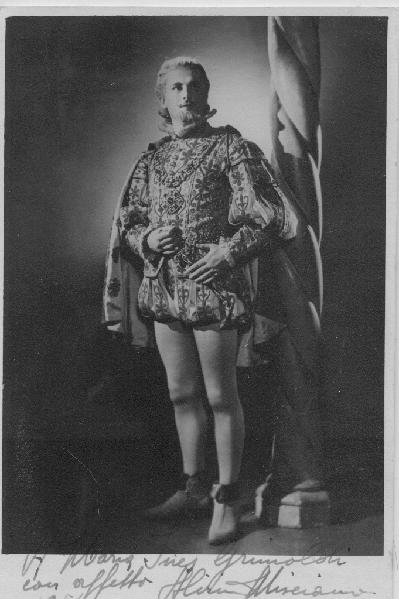Misciano didn't quite know what to do with himself before being drafted into the Italian army in World War II. He made the rank of
first lieutenant, and his adjutant was baritone Paolo Silveri – who discovered his voice, and persuaded hesitant Alvinio
Misciano to study voice after the war.
Misciano made his debut immediately when peace returned: on 9 March 1945, in a tiny comprimario part in La fanciulla del West
at the Teatro dell'Opera in Rome. Only then, he trained his voice (among others with Mario Basiola), again in Rome, where he also
made his "real" debut in May 1947, as Rinuccio. Then he joined a touring troupe for a considerable time, getting about as far as
South Africa and Australia. He returned to Italy only in the early 1950s.
The centers of his career were Rome (both the Teatro dell'Opera and the Terme di Caracalla, through 1971) and La Scala, where he sang
from 1956 to 1974, primarily in contemporary works. Other than that, he appeared in Zürich, Rio de Janeiro, Buenos Aires, Lisbon,
Athens, Budapest, Monte Carlo, at the festival in Spoleto, a whole lot at the Maggio Musicale in Florence, further at the San Carlo
in Naples, the Regio in Torino, in Bologna, Palermo, Trieste, Prague, Stuttgart, at the Vienna Staatsoper, in Cairo, Chicago (1958),
at the Drury Lane Theatre in London (1958, as well), the Théâtre des Champs-Élysées in Paris (1962, world
premiere of L'opéra d'Aran by Gilbert Bécaud), at the Fenice in Venice or at the Margherita in Genova. In 1968,
he also toured North America with Rossini's La cambiale di matrimonio in a production by the Rome-based Piccolo Teatro
Musicale. Last not least, he appeared in several TV productions of operatic works.
His repertory was varied; other than the numerous contemporary operas already mentioned, he sang also a lot of baroque music, Alfredo,
Fenton, Wilhelm Meister, Gounod's Faust, Werther, Pinkerton, Rodolfo, Prunier, Max (at the Maggio Musicale 1965, in German!),
Amico Fritz, Pâris or Jacquino. He was one of the preferred singers of legendary stage director Giorgio Strehler and, by the
way, a personal friend and mentor of Luciano Pavarotti.
Misciano retired in 1977 after the death of his mother that was very hard on him (she had always accompanied him on his travels). He
died in an accident: already much weakened by age, he leaned out of the window to check the weather – and fell down four
floors before hitting the pavement.
Reference 1: Corriere della Sera, 11 January 1997; reference 2: Kutsch & Riemens; reference 3
